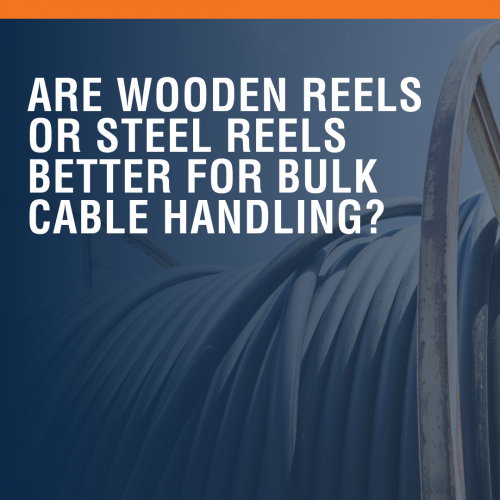We use cookies to make your experience better. To comply with the new e-Privacy directive, we need to ask for your consent to set the cookies. Learn more.
Are Wooden Reels or Steel Reels Better for Bulk Cable Handling?

That’s starting to change. Steel reels, which were once most commonly used in offshoring, are quickly becoming a better option for other types of facilities. While steel and wooden reels are fundamentally similar, they differ in several important ways:
Durability - Wooden reels warp over time, even when made from high-quality materials. Simply put, steel models have much longer operational lifespans than wood or plywood reels. The good news is that wooden cable reels are relatively inexpensive and can be switched out easily. They can also be recycled or used for other purposes at the end of their operating lives (in particular, wooden reels make great industrial tables).
Versatility - Steel reels can hold cable weighing in excess of 11,000 pounds, and they’re a better option for long-term storage. When wooden reels are used to store large amounts of cable for more than six months, warping becomes more likely.
Cost - Here’s where wood has a major advantage. Unsurprisingly, wooden reels are cheaper than steel, though steel drums have become substantially less expensive in recent years. However, given the aforementioned differences in durability, steel reels are typically a better investment for long-term use.
Wooden reels are still a preferable option for short-term use, and they’re typically less heavy than steel, which can be advantageous in certain applications. Plywood reels, designed for light-duty use, can also be preferable to steel when handling lighter cables, particularly in commercial electrical work. Typically, plywood reels are used once, then recycled.
Regardless of whether your operation uses wooden reels or steel spools for bulk cable handling, invest in appropriate equipment to keep your cable protected. The BHS Wire Pull Cart (WPC) protects wire when not in use. With fork pockets, swivel casters, and adjustable shaft positions that accommodate different spools/reels easily, the WPC allows for faster electrical installations by ensuring steady payout. Tools like the Parallel Reel Payout Wagon (PRW) and Dyna Reel Platform (DRP) further improve payout while conserving space. Large-scale cable distributors may wish to stock both materials to meet customer demand; ultimately, it’s the end-user who should make the choice between steel and wooden reels.
